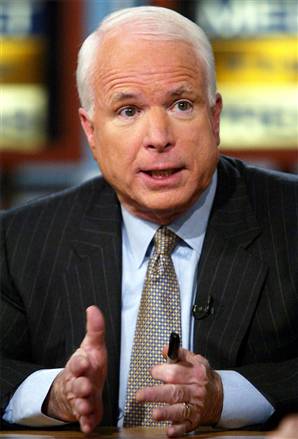In an effort to show that, if elected, he would be president of “all the people,” John McCain has visited the Edmund Pettus Bridge in Selma, Ala., the scene of one of the bloodiest civil rights marches in history. He’s also traveled through Alabama’s impoverished Black Belt region, and showed up for services commemorating the 40th anniversary of the Rev. Dr. Martin Luther King Jr.’s assassination in Memphis.
Those gestures, designed to soften McCain’s public image, cannot hide his awful record on civil rights.
In 11 grading periods since he began serving in the U.S. House of Representatives in 1983 and the Senate in 1987, McCain has earned an F for every period, according to an annual report by the NAACP.
Of the 11 grading periods, McCain’s highest score was 50 percent (1985-86), meaning he supported positions on legislation favored by the NAACP half of the time. His second-highest score was 40 percent (1997-1998). In the nine other grading periods, he supported the NAACP 30 percent of the time or less.
Instead of getting better on civil rights in recent years, McCain has grown worse. Since his unsuccessful 2000 bid for president, McCain voted with the NAACP just 27 percent of the time during the 107th Congress, 15 percent in the 108th Congress and an all-time low of 7 percent during the first session of the 109th Congress, which ended in 2006.
When he ran for president in 2000 and again this year, McCain refused to complete a questionnaire submitted to presidential candidates by the NAACP and turned down invitations to address the national conventions of both the NAACP and the National Urban League.
Even Ronald Reagan, who went to court to invalidate voluntary affirmative-action programs, and George W. Bush, who often clashes with civil rights leaders, have addressed the two groups.
After addressing the NAACP in Cincinnati and another appearance scheduled for the National Urban League in Orlando, McCain’s record will speak louder than anything he will have to say. An examination of McCain’s years in Washington shows that he opposed initiatives favored by the NAACP even when Republican moderates joined forces with the nation’s oldest and largest civil rights organization. Often portrayed in the media as a Republican maverick, McCain’s civil rights record shows he is anything but that.
In a vote likely to haunt him for the rest of his public career, McCain voted against 1983 legislation establishing the third Monday in January as the federal holiday marking King’s birthday. Back home in Arizona, he supported Gov. Evan Mecham’s decision in 1987 to rescind an executive order creating a state holiday for King, but later reversed his position.
In 1985, McCain voted against a bill to strengthen sanctions against minority-ruled South Africa because of its policy of apartheid.
In 1998, McCain voted against the Civil Rights Restoration Act requiring institutions receiving federal funds to follow antidiscrimination laws, upheld by Congress despite a presidential veto.
In what would become one of the greatest wedges between McCain and African Americans, McCain voted to confirm a series of ultra-conservative nominees to the Supreme Court, beginning with the failed nomination of Robert Bork.
McCain supported the nomination of Clarence Thomas to the Supreme Court – and has since indicated that he would appoint similar judges if elected president.
He favored repealing a provision of the Brady Bill requiring a seven-day waiting period for handgun purchases to ensure buyers aren’t mentally ill or don’t have a criminal record.
McCain and the NAACP agreed on the re-authorization of the Voting Rights Act, which was passed by the Senate 98-0, and the Civil Rights Act of 1991 moderating a series of Supreme Court decisions that narrowed the scope of job-discrimination laws.
McCain supported an amendment by Sen. Phil Gramm (R, Texas) that prohibited federal contracts to be based, in part, on race, color, national origin or gender.
During the 105th Congress, McCain opposed forgiving student loans up to $8,000 for public-school teachers who work in underserved communities for a specified period and opposed expanding after-school programs. However, he supported an amendment offered by Sen. Judd Gregg (R., N.H.) that would have provided federal funding for vouchers for students to attend private schools.
McCain prides himself on his straight talk. Unfortunately, when it comes to supporting civil rights, he has not had a straight walk.
George E. Curry, former editor-in-chief of Emerge magazine and the NNPA News Service, is a keynote speaker, moderator, and media coach. His Web site is www.georgecurry.com.


Be the first to comment